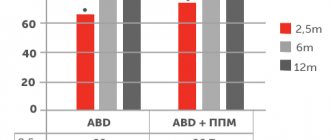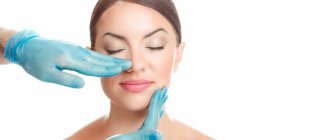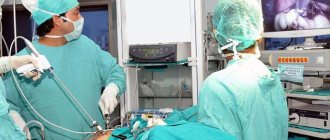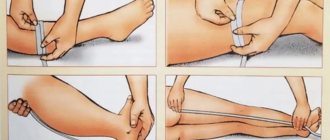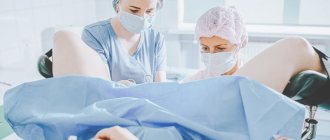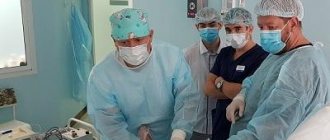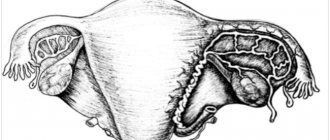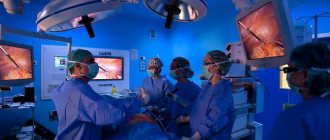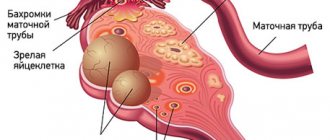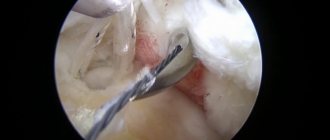Duration of recovery period
The length of the recovery period after removal of an inguinal hernia depends on the type of surgery used and its complexity. After the operation, which was performed under general anesthesia, the patient spends several more days in the hospital. In mild cases, he can be discharged on the same day - if all recommendations are followed at home.
The outpatient period in most cases lasts 8-10 days after surgery. During this time, you should stay in bed if possible and avoid physical activity. In addition, during the outpatient period, a certain diet is followed.
If recovery proceeds at a normal pace, then after two weeks the doctor will allow you to return to normal physical activity and even prescribe a set of exercises to strengthen the muscles. Sometimes this period lasts longer and is up to 25 days. Returning to full physical activity may take from a month to six months.
Features of knee surgery
Arthroscopy of the knee joint is performed in the presence of cysts, arthritis, arthrosis, intra-articular fractures or deformation of the articular cartilage. Before the operation, the patient will have to undergo a series of tests to ensure there are no contraindications. Surgery is performed under general anesthesia or conduction anesthesia. The uniqueness of arthroscopy lies in the fact that today it is the only option for minimally invasive intervention that allows you to diagnose and eliminate the pathological process simultaneously. In general, the operation lasts from 1 to 2 hours, depending on the severity of the diagnosis.
Causes of complications after surgery
Abdominal surgery is stressful for the body. Rehabilitation after removal of an inguinal hernia does not always go smoothly. Complications may arise due to:
- The appearance of pus in the abdominal cavity is caused by non-compliance with the rules of postoperative care;
- Formation of hematomas - this is explained by injury during surgery, but sometimes the cause is too tight compressive bandages and abuse of cold compresses;
- Damage to blood vessels or nerves due to a mistake by the surgeon himself. Neurological disorders are accompanied by loss of sensitivity. In severe cases, if the tumor is removed incorrectly, men may even develop testicular atrophy due to vascular damage. Treatment in such cases is prescribed by a doctor;
- Vein thrombosis of the legs - this is most often encountered by elderly patients. In such cases, the doctor prescribes anticoagulants and other drugs;
- Intestinal dysfunction - over time, thanks to a therapeutic diet, everything should return to normal.
Sometimes in the postoperative period a relapse occurs - re-formation of the hernia. It may be associated with individual characteristics of the development of muscle tissue, with natural muscle aging, but most often it is provoked by increased stress and refusal to diet.
After surgery, tissue swelling may occur. It causes pain. Pain may be associated with the natural healing process of the tissue, but also with suture dehiscence. Therefore, during the recovery period after removal of an inguinal hernia, you should regularly visit the doctor for a preventive examination.
Physical activity in the postoperative period
The decision on the advisability of physical activity is made by the doctor. In the first 10-20 days after surgery, loads are eliminated. Then physical therapy classes begin, but intense sports should be avoided, and lifting weights (weighing more than 4-5 kg) is also prohibited.
To speed up rehabilitation after removal of an inguinal hernia, therapeutic massage is prescribed. It must be carried out by a medical professional. The procedure affects the lumbar region, legs, and abdomen. This is done to improve muscle blood circulation and intestinal function. Massage is prescribed no earlier than 7-9 days after surgery. Such procedures are performed in medical centers whose specialization is rehabilitation for adults. Physiotherapeutic procedures may also be prescribed.
Rehabilitation after surgery to remove an inguinal hernia allows for muscle strengthening exercises:
- Classic exercise "Scissors". From a lying position on the floor with arms extended along the body, raise the legs at an angle of approximately 45 degrees and cross them. Start with 3-4 repetitions for each leg, gradually increase the load;
- "Bike". They can also do it while lying on the floor, using their feet to imitate pedaling. To begin with, five repetitions will be enough;
- From the starting position, standing on all fours and focusing on your elbows, slowly raise your leg bent at the knee. For each leg – 5 repetitions;
- Partial squats. Starting position: standing, feet shoulder-width apart. The depth of the squat is determined empirically, based on how you feel. Start with five repetitions;
- Full push-ups while lying down. But in the postoperative period, you can lean on your knees to make it easier.
A doctor who is observing a patient during the rehabilitation process after surgery to remove an inguinal hernia may recommend other exercises. If a person feels weak while performing a set of exercises, you need to stop exercising. Perhaps the workload should be reconsidered. The increase in the duration of classes and the number of repetitions should be smooth.
Discharge after laparoscopy of ovarian cyst
After surgery to remove an ovarian cyst using laparoscopy, many women report intense vaginal discharge consisting of mucus, blood and clots, which can last up to two weeks. After laparoscopy, the discharge from ovarian cysts is intense for a week, but in the second week the discharge decreases.
Pathological discharge that occurs during complications is distinguished by an unpleasant odor and a green or yellow tint. Curdled abnormal discharge indicates the development of an infectious process in the genital tract.
Specialists at the Yusupov Hospital pay close attention to each patient, so when pathological signs and complications appear, their signs are identified and therapeutic measures are prescribed, and the condition after laparoscopy of the ovarian cyst is assessed. Diagnostics carried out at each stage of treatment make it possible to identify possible disorders and determine the effectiveness of therapy.
Recovery bandage
The recovery process after surgery to remove an inguinal hernia involves wearing a therapeutic bandage. This is necessary to prevent relapse. Wearing a bandage can reduce the load on the abdominal muscles and prevent muscle strain.
The bandage evenly distributes the load, reduces pressure on the problem area, and scars heal faster. The duration of wearing the bandage is determined by the doctor.
Currently, many clinics use new operating methods, when areas of potential tumor formation are fixed with the help of special implants. Thanks to this, you don’t have to wear a bandage. But many doctors recommend wearing a bandage during the rehabilitation process after removal of an inguinal hernia, at least in the initial period after surgery, when the pain is most severe.
Diet after excision of inguinal hernia
The recovery process after removal of an inguinal hernia includes following a therapeutic diet. The diet is designed to improve the functioning of the digestive system. There should be no constipation, diarrhea, or flatulence, since they increase intra-abdominal pressure and increase the load on the muscles.
The rules of nutrition in the postoperative period are simple:
- Preference is given to dishes with liquid and semi-liquid consistency;
- There should be four meals a day, but the portions should be relatively small;
- Particular attention is paid to protein products. The diet includes low-fat cottage cheese, eggs, chicken or turkey (in the first days after surgery it is given in the form of a soufflé, then steamed cutlets). It is better not to consume whole milk to prevent flatulence. But it can be replaced with fermented milk products;
- You should not eat legumes, yeast baked goods, fruits, or brown bread, as they also cause increased gas formation.

After the inguinal hernia has been removed, the recovery process imposes other restrictions. You should not drink sweet soda or alcohol, and you will also have to give up strong coffee.
Proper nutrition for sports
By following the diet prescribed by the doctor, the patient will not only go through the postoperative period faster, but will also have the strength for light physical activity. You can’t eat on the first day after surgery, but you can drink. To quench your thirst, mineral water, fruit compote, fruit juice, jelly or weak tea are suitable. Next, it is recommended to adhere to a special diet. Starting from the second day, you should eat little and often (5-6 times a day). Foods that are difficult for the gastrointestinal tract are temporarily excluded from the diet.
The foods listed below are prohibited:
- spicy, fried, fatty foods cooked in large amounts of oil or using animal fats;
- smoked, pickled products, canned food;
- fatty meat and lard;
- sweets and other similar products, fresh buns (these products are often the “culprits” of flatulence, for the same reason it is recommended to refrain from eating legumes);
- alcoholic drinks (for at least a month after laparoscopy).
Rehabilitation at home
When the patient is discharged from the hospital, rehabilitation after removal of the inguinal hernia is carried out at home. But do you need to follow all the doctor’s recommendations?
- Do not lift heavy objects for 20-25 days;
- Stop smoking - it provokes coughing attacks, and the suture may come apart because of this;
- Perform the listed exercises;
- Change bandages regularly, come for a routine examination to the doctor;
- Monitor digestion and avoid urinary retention.
If your doctor prescribes physical therapy, you should attend regularly.
Pain after removal of an ovarian cyst
Patients are most often bothered by pain after laparoscopy of ovarian cysts, the duration of which can reach 7 days. This symptom is a natural reaction of the body to damage; it occurs after the sutures have healed.
If a patient has pain in the ovary after removal of a cyst, she is advised to rest in bed; in addition, it is recommended not to make sudden movements and adhere to certain dietary rules. Medicines are prescribed by the attending physician if the pain intensifies.
Sex during the postoperative period
Returning to the usual rhythm of life does not happen immediately, this also applies to the intimate sphere. Sex in the first week after removal of an inguinal hernia can provoke a number of undesirable consequences: the appearance of severe pain, swelling, and the formation of hematomas. There is a risk of infection and suture dehiscence. But, if the postoperative rehabilitation of the removed inguinal hernia goes well, then it will be possible to return to intimate relationships two weeks after surgery.
This can only be done if there is no swelling, pain, or discomfort. And even in this case, you need to try to avoid excessive stress and stress.
If you follow the doctor's recommendations, most patients have a postoperative period without complications.
Preventive actions
Joint diseases have a genetic predisposition. If one of your relatives has problems with joints, there is a high risk that this problem will affect you too. If you follow several rules of prevention, this can be avoided: Avoid hypothermia. Don't overdo your workouts. Work with heavy weights should only be carried out under the supervision of a specialist. If pain or discomfort occurs, consult a doctor immediately. Remember that any pathology is much easier to treat at an early stage. Try to move more, walk and do exercises daily. If you couldn’t avoid troubles with your joints, don’t despair. Arthroscopy is a unique way to eliminate the pathological process in a minimally invasive way. There are no scars or scars left after the operation, and the recovery period is also relatively fast. Patients soon return to their normal lifestyle and even continue their sports career.
